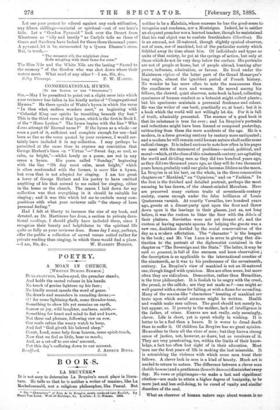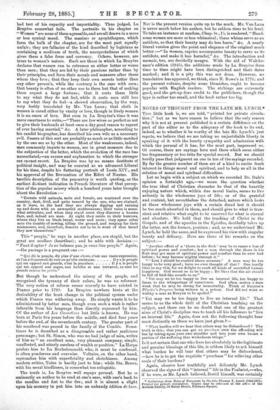B 0 0 K-S.
• LA 131113YERE.* IT is not easy to determine La Bruyere's exact place in literature. He tells us that he is neither a writer of maxillas, like La Rocliefoucauld, nor a religious philosopher, like Pascal. But neither is he a frabelais, whose excesses he has the good-aenee recognise and condemn, nor a Montaigne. Indeed, he is neither an eloquent preacher nor a learned teacher, though he maintained that his real object was to conflate freethinkers (libertine), He is an amused, not ill-natured, though slightly cynical observer, not of man, nor of mankind, but of the particular society which frit:Ned away its time about him. Of individuals and types as units of that society, he got at the springs of action,. but only at those which do not lie very deep below the surface. Ris-portraitsare not of people at home, but of people abioad, hunting after power, influence, admiration, or favour. He lived under theAlaintenoa rigiaie of the latter part of the Grand Monarque's long reign, almost the ignoblest period of French history. No wonder he has more often to note the meaunesses than the excellences of men and women. He moved among his fellows, the shrewd, quiet observer, note-book in hand, collecting specimens of human conduct as a botanist might collect plants;. but his specimens maintain a perennial freshness and colour. He was the writer of one book, practically so, at least; but it is a book which the world will not willingly let die. For it is full of truth, admirably presented. The essence of a good book is that its substance is true for ever ; and La Bruyere's portnaits and reflections might have been limned or composed yesterday, subtracting from them the mere accidents of the age. He is a. modern, in a dress growing century by century more antiquated ; and a modern he will remain until human nature shall suffer some radical change. It is indeed curious to note how often in his pages we meet with the statement of problems—social, political, and moral—which, at the close of this nineteenth century, are agitating the world and dividing men as they did two hundred years ago,. as they did two thousand years ago, as they will do two thousand years hence,,probably until our globe becomes lifeless as the moon.. La Bruyere is at his best, on the whole, in the three consecutive chapters on" Mankind," on "Opinions," and on "Fashion." In the first is the finished and detailed portrait, perhaps the most amusing he has. drawn, of the absent-minded Menalcas. Hereare preserved many curious traits of seventeenth-century society, coarse enough under the false brilliance of Louis Quatorzean varnish. At courtly Versailles, two hundred years ago, guests at a dinner-party spat upon the floor and threw down upon it the leavings in their glasses, just as, not long before, it was the custom to litter the floor with the debris of their platters. Serviettes were not yet dreamt of; and the custom of having separate spoons for helping the guests was a new one, doubtless derided by the social conservatives of the day as a modern affectation. The "character" in the longest in the book ; and Mr. Van Leon is in error in giving that distinction to the, portrait of the diplomatist contained in the chapter on "The Sovereign and the State." The latter, it may be said en passant, is full of floe sarcasm and keen observation ; the description is as applicable to the international courtier of the nineteenth, as it was to his predecessor of the seventeenth,. century. La Bruyere's view of mankind is not an. ill-natured one, though tinged with cynicism. Men are often mean, but more often they are ridiculous. Democritus, rather than Heraclitus, is the true philosopher. It is foolish to be angry with the cruel,. the proud, or the selfish ; are they not made so ?—one might as well quarrel with,a stone for falling, or with a flame for ascending. Many of the maxim-like " characters " treating of ro:ankind are texts upon which social sermons might be written. Health and wealth make men callous. The good should not merely be, but appear, so. If poverty is the mother, lack of intelligence is the father, of crime. Knaves are not really, only seemingly,. clever. Life is short, yet is spent wholly in wishing. It is better to be a fool than a knave. It is worse to dread death than to suffer it. Of children La Bruyerebas no great opinion. Re ascribes to theta all the vices of men ; bat they have a strong sense of justice, not, however, as doers; but as receivers of it. They are very penetrating, too, within the limits of their knowledge, a fact too often lost sight of in their education. Most 'men use the first years of life in making the last miserable. It is astonishing the violence with which some men treat their fellows.. A clever look in men is a kind of beauty. Mach art is needed to return to nature. The difference between a clever man (habile hem mt) and a gentleman (honniite humme)diminisheieveity day. No vows or pilgrimages—to make a last and significant citation—are made to attain a higher degree of benignity, to be more just endless evil-doing, to he cured of vanity and similar disorders of the soul.
What an observer of human nature says about women is no
bad test of his capacity and impartiality. Thus judged, La Brayere somewhat fails. The portraits in his chapter on "Women" are none of them agreeable, and are all drawn in a more or less cynical mood. The maxims or apophthegms, which form the bulk of the chapter, are for the most part equally unfair; they are fallacies of the kind described by logicians as containing a modicum of truth, the unexpectedness of which gives them a false force and currency. Others, however, are truer to woman's nature. Bach are those in which La Brnyere declares that women run to extremes as either better or worse than men ; that they are led by their passions 'rather than by theirprinciples, and form their morals and manners after those wham they lore ; that they keep their own secrets better than any other person's, while the contrary is the case with men; that beauty is often of no other use to them but that of making them expect a large fortune ; that it costs them little to say what they do not feel, while it costs men still less to say what they do feel—a shrewd observation, by the way, very feebly translated by Mr. Van Laun ; that sloth in women is cured either by vanity or love, though in lively women it is an omen of love. But even in La Bruyere's time it was mere smartness to write,—" There are few wives so perfect as not to give their husbands at least once a day good reason to repent of ever having married," &c. A later philosopher, according to Iris candid biographer, has described his own wife as a necessary evil. Sneers of this sort are probably as much or as little merited by the one sex as by the other. Most of the weaknesses, indeed, men commonly impute to women, are in great measure due 'to the subjection of the latter, which the evolution of the race has
mecessitated,—an excuse and explanation to which the stronger sex cannot resort. La Brayere was by DO means destitute of
political insight, and may be counted as an advanced Liberal for his time, despite his flattering portrait of Louis XIV., and his approval of the Revocation of the Edict of Nantes. His terrible description of the peasantry is worth quoting, as the earliest distinct indication in French literatureof that perception of the popular misery which a hundred years later brought about the Revolution :—
" Certain wild animals, male and female, are scattered over the
• country, dark, livid, and quite tanned by the sun, who are chained, as it were, to the land they are always digging and turning up and down with an unwearied stubbornness; their voice is somewhat articulate, and when they stand erect they discover a human face, and, indeed are men. At night they retire to their burrows, where they live on black-bread, water and roots ; they spare other men the trouble of sowing, tilling the ground, and reaping for their sustenance, "and, therefore, deserve not to be in want of that bread they sow themselves."
This "peuple," he says in another place, are stupid, but the .great are soulless (heartless) ; and he adds with decision opter ? Je ne balance pas, je veux titre peuple." Again, —the passage is a pregnant one :—
" Qui dit Is peaple, dit plus d'une chose, c'est une vaste expression,
et l'on s'etonneroit de voir ce qa'elle embraase fly a le peuple -qui est oppos6 aux grands, c'est la populace Ii y a le peuple qui est. ppose aux sages, aux habiles et aux vertuenx, ce Bout les grands comme lea petits. '
But though he understood the misery of the people, and recognised the tyranny of their rulers, he was to reformer.
The very notion of reform seems scarcely to have existed in France prior to 1789. La Bray ere nowhere hints at the • -desirability of the least change in the political system under which France was withering away. He simply wants it to be • administered by better men, though even such a wish is rather inferable from his language than directly expressed by him.
Of the author of Lee CarcieThres but little is known. He was born at Paris-five years before the middle, and died four years before the end, of the seventeenth century. The greater part of
• his manhood was passed in the family of the Condes. Sometimes he is described as a disagreeable and rather malicious • personage ; but St. Simon, who was no bad judge of men, writes of him as" an excellent man, very pleasant company, simple, !unaffected, and utterly careless of wealth or position." La Harps prefers him to La Rochefoncauld, who, it must be confessed, is often ponderous and overwise. Voltaire, on the other hand, reproaches him with superficiality and sketchiness. Among modern critics, Taine is hardly just to him ; while Ste. Beuve, with his usual kindliness, is somewhat too eulogistic.
The truth is, La Bruyere well repays perusal. But be is eminently an author to be read at one's ease, witbone'e back to the candles and feet to the fire ; and it is almost a slight upon his memory to put him into an unhandy edition de luxe.
Nor is the present version quite up to the mark. Mr. Van Laun is never much below his author, but he seldom rises to his level. To take an instance at random, Chap. iv., 15, is rendered, "Handsome women are more or less whimsical; these whims serve as an antidote, so that their beauty may do less harm," &c. A nearly literal version gives the point and elegance of the original much 1better :—" In *omen, caprice accompanies beauty to serve as its antidote, and make it less harmful," &e. The introduction and memoir, too, are decidedly meagre. With the aid of Walckeuser's edition (1845), the additions made by La Bruyere from time to time might have been distinguished and their dates marked ; and it is a pity this was not done. However, no translation has appeared, we think, since N. Rowe's in 1776; and the present volume, despite some blemishes, ought to become popular with English readers. The etchings are extremely good, and the get-up does credit to the publishers, though the type is rather too small, and the book rather too big.



































 Previous page
Previous page